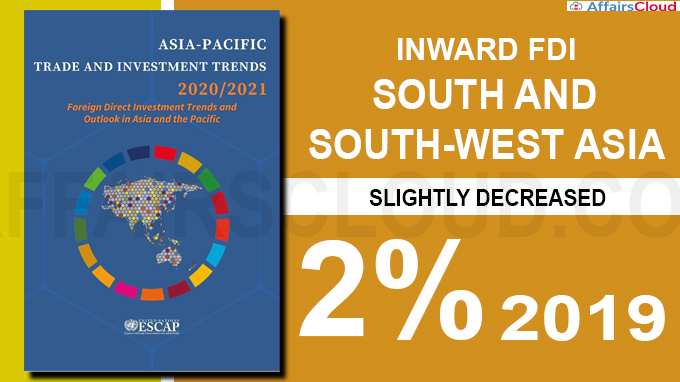 According to the report ‘Foreign Direct Investment Trends and Outlook in Asia and the Pacific 2020/21’ released by the United Nations Economic and Social Commission for Asia and the Pacific (UN ESCAP) stated that inward FDI flows to South and South-West Asia slightly decreased by 2% in 2019, from $67 billion in 2018 to $66 billion in 2019. India has accounted for 77% of total Foreign Direct Investment (FDI) inflows to South & South-West Asian subregion.
According to the report ‘Foreign Direct Investment Trends and Outlook in Asia and the Pacific 2020/21’ released by the United Nations Economic and Social Commission for Asia and the Pacific (UN ESCAP) stated that inward FDI flows to South and South-West Asia slightly decreased by 2% in 2019, from $67 billion in 2018 to $66 billion in 2019. India has accounted for 77% of total Foreign Direct Investment (FDI) inflows to South & South-West Asian subregion.
- The pandemic has caused both FDI inflows and outflows to drop by 49% in the first 2 quarters of 2020 when compared to the same in 2019.
Highlights of Overall FDI inflows:-
- Asia-Pacific’s share in global FDI inflows dropped from 45% in 2018 to 35% in 2019, and its share in global FDI outflows decelerated from 52% to 41%.
- China & Hong Kong were the largest FDI recipients in 2019 attracting 38% of total FDI inflows.
Highlights of Overall FDI Outflows:-
- FDI outflows from South and South-West Asia increased for the fourth consecutive year, modestly growing from $14.8 billion in 2018 to $15.1 billion in 2019.
- Uneven spread of FDI outflows in the region, only 2 countries – India & Turkey accounted for majority of outflows in 2019.
- Japan was the largest source of investment in the region in 2019, responsible for 42% of regional outward FDI.
India’s performance in this report :-
India has accounted for 77% of total Foreign Direct Investment (FDI) inflows to South & South-West Asian subregion receiving about USD 51 Billion in 2019, which recorded as 20% higher than the year 2018.
ii.Also India(10%) registered the third largest share of inward greenfield investment.
- Greenfield Investment– A type of FDI where a company establishes operations in a foreign country, the company constructs new facilities in foreign soil from the basic things.
iii.The majority of the FDI in India was in the fields of Information & Communications Technology (ICT) & Construction sector.By 2025, digital sectors such as IT and business process management, digital communication services, and electronics manufacturing would be increased double in size.
iv.Apart from the services sector, India is attracting investments in local digital ecosystems such as e-commerce. FDI from India is projected to decline in 2020 due to the impact of COVID-19.
v..The report has stated that India’s economy would prove to be the strongest in the subregion in the long term.
vi.In the first three quarters of 2020, the value of greenfield FDI inflows declined by 43 percent compared to 2019.Most of the greenfield flows (87 percent) were destined for India, though the overall greenfield inflows to the country declined by 29 percent.
Notable Investments in India:
The report has highlighted some notable investments made in India
- USD 7 Billion Acquisition of Essar Steel(India) by a Japanese-Indian joint venture.
- Facebook & Google’s investment in Reliance’s Jio Platforms worth USD 5.7 Billion & USD 4.5 Billion.
India’s investment policies and measures since 2019:
i.The report highlighted Investment friendly policies taken by India since 2019 such as relaxation limits to FDI in Insurance sectors, liberalization of FDI rules in coal & lignite mining, contract manufacturing & single brand retail trading.
ii.Increasing FDI in the defense sector to 74% via automatic approval route.
Regional Comprehensive Economic Partnership (RCEP):
The signing of Regional Comprehensive Economic Partnership (RCEP) by ASEAN countries in November 2020 is expected to strengthen the flow of FDI & lift investment prospects in smaller & least developed countries in the region.
Click Here to Read the Full Report
Recent Related News:
i.UN ESCAP report ‘Geospatial Practices for Sustainable Development in Asia and the Pacific 2020: A Compendium’ has cited the role of ISRO’s ‘BHUVAN’ Geo-Portal in combating COVID-19 in India.
ii.June 17, 2020, In accordance with the “World Investment Report 2020” by UNCTAD, India has become the 9th largest recipient of FDI in 2019 after receiving $51 billion last year.
About UN Economic and Social Commission for Asia and the Pacific (UN ESCAP):
Executive General – Armida Salsiah Alisjahbana
Headquarters – Bangkok, Thailand




